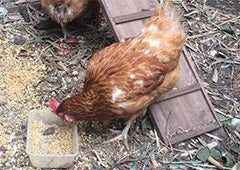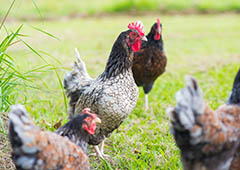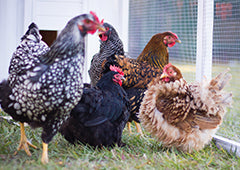Deciding to own chickens is a great choice - they make wonderful pets, provide many tasty eggs and are one of those rare animals that requires relatively low maintenance. If you're a budding chicken enthusiast who's a little unsure of the foundations, here's your Chicken 101 guide to everything poultry! Let’s start with the basics - the chicken itself.
What kind of chickens should I get?
There are many different breeds that vary in price, egg-laying capabilities and ability to withstand different temperatures. It all depends on your personal preferences. Would you prefer small bantam chickens that make great pets, but generally lay a few less eggs? Or are you primarily after a constant supply of eggs, from a breed specifically designed to do so? You could even look at rescuing a hen - there are hundreds of ex-battery hens that have been saved from the cruelty of cages and would greatly benefit from some tender loving care. Do a little research into the different breeds, and work out what budget you have to play with. Our breed profiles have a comprehensive guide to many different types of chickens, you you can pinpoint the one that satisfies your needs.
Do I need to have a rooster for the chickens to lay eggs?
No. Hens are absolutely magical creatures that can produce eggs all on their lonesome. Without going into the specific scientific mumbo jumbo, the process of creating an egg is stimulated by the hens surroundings. Very soon after the cycle is complete and an egg is laid, the process begins again almost immediately! As there has been no rooster involved, these eggs are unfertilized and can never mature into baby chicks. It is only if your after fertilized eggs that you'll need to employ the services of a rooster. Alternatively, many chicken retailers can provide already fertilized eggs if you're considering incubation.
When do chickens start laying eggs?
The amount of time that elapses between birth and laying their first egg varies according to breed, environment and other variables. Many farmers and retailers have ‘point of lay’ hens available for purchase, which means that technically they are at an age where they have begun to produce eggs. For full-size hens, this will generally be around the three month mark.
With bantam hens, you should start looking for eggs in the nest at around six months of age, but its not uncommon for hens to reach 12 months before laying for the first time. You can potentially speed up the process by ensuring they always have access to quality feed, fresh water and a stress-free environment.
Can I have more than one breed of chicken?
Absolutely! A mixed flock is an absolute joy to own - you get so many varying personalities and therefore endless entertainment! You can mix bantam hens with full size, and mix breeds together. Just make sure you try and have an even spread of varying breeds - one white hen in a flock of red ones can sometimes lead to the lone bird getting picked on.
How much do chickens cost to maintain?
Chickens are hungry animals - some of the more ravenous can eat up to a cup of food a day! But when you think about the weight of the egg they are producing daily, this seems to be fair. Other costs involved include the coop, feeders, bedding etc. Our article How Much Does It Cost To Raise Chickens has more information on the individual monthly costs of raising chickens. In an egg shell, after the initial cost of the coop and all the start-up materials you'll need, chickens are an exceptionally cheap and friendly pet that most people can afford to keep.
How many eggs should I expect to get?The amount of eggs vary from breed to breed. With a chicken like the Rhode Island Red, you can have 300 eggs in a year! Other breeds like the Silkie lay less eggs annually, (around 150-200) but are popular because of their friendly and sweet personalities. Our breed profiles give an accurate description of each chickens egg-laying capabilities.
Owning chickens is a very fulfilling experience - the more you nurture and care for them, the more eggs they'll provide. And they make lovely family pets that you and your children will enjoy for 15, maybe even 20 years! For more detailed information to help inform some of your decisions, check out our Breed Profile articles.
From breeds to feeds, there are plenty of things to consider when becoming a chicken parent. We all want to do an eggcellent job in creating a happy and healthy flock. However, many chicken keepers struggle to handle chicken health or behaviour issues, especially in the first few years of having a flock.
This is why I recommend Chickenpedia to all my readers. They have comprehensive online courses on everything you didn’t know you need to know and then some more! From healthcare to raising baby chicks to feeding and behavior, you’ll find beginner-friendly courses that’ll give you the knowledge and confidence to successfully look after your chickens.
As a member, you will get access to ALL their fantastic courses. No need to wing it, become the ultimate chicken eggspert! Check out Chickenpedia today!
Remember, pets with personality need a coop with character, so make sure you have a sticky beak at our range of coops that include the Taj Mahal, Penthouse and Mansion. All of which will make an exceptionally comfortable home for your cute and cuddly chickens.
Here are some more articles that will help on your chicken keeping journey...
A Complete Beginner's Guide To Keeping Chickens
Why Have My Chickens Stopped Laying The Top 8 Best Laying Hens For Backyard Chickens Sources and further reading


















